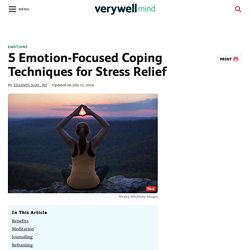

*Additional resources* Teaching Teenagers to Cope With Social Stress. Almost four million American teenagers have just started their freshman year of high school.

Can they learn better ways to deal with all that stress and insecurity? New research suggests they can. Though academic and social pressures continue to pile on in high school, teenagers can be taught effective coping skills to skirt the pitfalls of anxiety and depression. David S. Yeager, an assistant professor of psychology at the University of Texas at Austin and a leading voice in the growing effort to help college students stay in school, has been turning his attention to younger teenagers to help shore up their resilience at an earlier age. His latest study, published in the journal Psychological Science, found a surprisingly effective technique. The students who completed the exercise subsequently had lower levels of stress, reported more confidence in coping and achieved slightly higher grades at year’s end, compared to a control group.
The studies are small. John R. Dr. Dr. Mindfulness stress coping and everyday resilience among emerging youth in a university setting a mixed methods approach. Stress and Stress Management Among Youth and Young. Stress: Why does it happen and how can we manage it? Stress is a natural feeling of not being able to cope with specific demands and events. However, stress can become a chronic condition if a person does not take steps to manage it.
These demands can come from work, relationships, financial pressures, and other situations, but anything that poses a real or perceived challenge or threat to a person’s well-being can cause stress. Stress can be a motivator, and it can even be essential to survival. The body’s fight-or-flight mechanism tells a person when and how to respond to danger. However, when the body becomes triggered too easily, or there are too many stressors at one time, it can undermine a person’s mental and physical health and become harmful. Stress is the body’s natural defense against predators and danger.
When humans face a challenge or threat, they have a partly physical response. The body produces larger quantities of the chemicals cortisol, epinephrine, and norepinephrine. 20 Creative Ways To Deal With Stress. Do you feel like you've reached a point in the year where you're just overwhelmed?

April is Stress Awareness Month, which makes total sense because it seems to be the month when students hit their breaking point. It's so close to the end of the semester that you can feel the pressure of finals start to wash over you like a tidal wave. At this point in the year, knowing how to manage stress is crucial to your success and survival through these last few weeks. As a professional ball of stress, I know a thing or two about how to deal with it. There are thousands, if not hundreds of thousands, of self-help articles on how to manage stress, but today let's explore some alternative methods you might not have tried yet. 1. It's common knowledge that exercise releases endorphins and helps with stress, but when you're stressed out, the last thing you want to do is run on a treadmill or do push-ups. 2. I mean… chocolate… need I say more? 3. 16 Simple Ways to Relieve Stress and Anxiety.
Stress and anxiety are common experiences for most people.

In fact, 70% of adults in the US say they feel stress or anxiety daily. Here are 16 simple ways to relieve stress and anxiety. Exercise is one of the most important things you can do to combat stress. It might seem contradictory, but putting physical stress on your body through exercise can relieve mental stress. The benefits are strongest when you exercise regularly. There are a few reasons behind this: Stress hormones: Exercise lowers your body's stress hormones — such as cortisol — in the long run.
Try to find an exercise routine or activity you enjoy, such as walking, dancing, rock climbing or yoga. Activities — such as walking or jogging — that involve repetitive movements of large muscle groups can be particularly stress relieving. 5 Emotion-Focused Coping Techniques for Stress Relief. Stress management techniques can fall into two categories: problem-focused coping and emotion-focused coping.

Basically speaking, problem-focused (or solution-focused) coping strategies aim to eliminate sources of stress or work with the stressors themselves, while emotion-focused coping techniques aid you in becoming less emotionally reactive to the stressors you face, or altering the way you experience these situations so they impact you differently. Many people think mainly of solution-focused coping strategies as the best way to manage stress, as cutting out the things that seem to cause us stress means we don't need to learn how to alter our responses to any stressors—there will be none left in our lives! However, it's not entirely possible to cut all stress out of our lives—some factors in our jobs, our relationships, or our lifestyles are simply prone to creating challenges.
Benefits The following techniques work well for the stress of all types. Meditation Journaling Reframing.